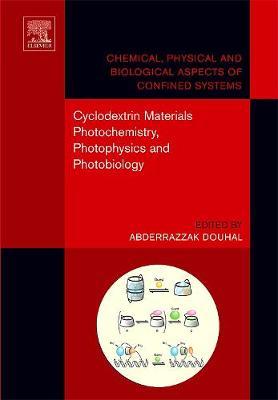Full Product Details
Author: Abderrazzak Douhal (Professor, Department of Physical Chemistry, Faculty of Environmental Science and Biochemistry, University of Castilla-La Mancha – Toledo, Spain)
Publisher: Elsevier Science & Technology
Imprint: Elsevier Science Ltd
Volume: v. 1
Weight: 0.780kg
ISBN: 9780444527806
ISBN 10: 044452780
Pages: 340
Publication Date: 11 August 2006
Audience:
Professional and scholarly
,
Professional & Vocational
Format: Hardback
Publisher's Status: Active
Availability: Manufactured on demand

We will order this item for you from a manufactured on demand supplier.
Reviews
"""This book highlighting studies of photophysical, chemical, and biological processes in molecular cages, such as cyclodextrins, is significant and timely as this area of research has blossomed particularly over the past decade, with the advancement of new limits for time resolution and spectral sensitivity."" --Prof. Ahmed H. Zewail, currently the Linus Pauling Chair Professor of Chemistry and Physics, and the Director of the Physical Biology Center for UST and the NSF Laboratory for Molecular Sciences (LMS), California Institute of Technology, Pasadena, USA. Professor Zewail was awarded the 1999 Nobel Prize in Chemistry for his pioneering developments in the field of femtoscience."
This book highlighting studies of photophysical, chemical, and biological processes in molecular cages, such as cyclodextrins, is significant and timely as this area of research has blossomed particularly over the past decade, with the advancement of new limits for time resolution and spectral sensitivity. Prof. Ahmed H. Zewail, currently the Linus Pauling Chair Professor of Chemistry and Physics, and the Director of the Physical Biology Center for UST and the NSF Laboratory for Molecular Sciences (LMS), California Institute of Technology, Pasadena, USA. Professor Zewail was awarded the 1999 Nobel Prize in Chemistry for his pioneering developments in the field of femtoscience.
This book highlighting studies of photophysical, chemical, and biological processes in molecular cages, such as cyclodextrins, is significant and timely as this area of research has blossomed particularly over the past decade, with the advancement of new limits for time resolution and spectral sensitivity. Prof. Ahmed H. Zewail, currently the Linus Pauling Chair Professor of Chemistry and Physics, and the Director of the Physical Biology Center for UST and the NSF Laboratory for Molecular Sciences (LMS), California Institute of Technology, Pasadena, USA. Professor Zewail was awarded the 1999 Nobel Prize in Chemistry for his pioneering developments in the field of femtoscience.
This book highlighting studies of photophysical, chemical, and biological processes in molecular cages, such as cyclodextrins, is significant and timely as this area of research has blossomed particularly over the past decade, with the advancement of new limits for time resolution and spectral sensitivity. Prof. Ahmed H. Zewail, currently the Linus Pauling Chair Professor of Chemistry and Physics, and the Director of the Physical Biology Center for UST and the NSF Laboratory for Molecular Sciences (LMS), California Institute of Technology, Pasadena, USA. Professor Zewail was awarded the 1999 Nobel Prize in Chemistry for his pioneering developments in the field of femtoscience.
Author Information
Abderrazzak Douhal has been studying the photochemistry and photophysics of composites using silica-based materials for many years. He published around 200 articles, and co-edited 3 books. He is serving in the editorial board of several international journals. For his work on the photochemistry of silica-based materials, he was awed by the International Association for Advanced Materials (2016), and by the Japanese Photochemistry Association (2018) for his work on the photochemistry of MOFs. For the last 3 decades, his research work focused on femtochemistry in liquids and confining media. His recent interest is deserved to elucidating the ultrafast spectroscopy and microscopy of hydrogen-bonded organic frameworks (HOFs), metal-organic frameworks (MOFs) and applications of their composites to lighting and sensing.




